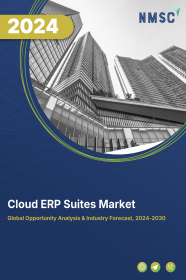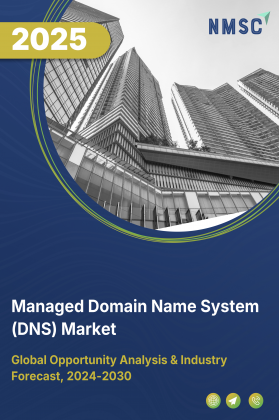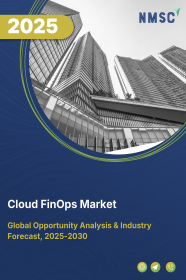
Cloud ERP Suites Market by Component (Solution and Service), by Deployment Model (Public, Private, and Hybrid), by Business Function (Accounting & Finance, Sales & Marketing, Inventory, and Order Management), by Organization Size (Small & Medium Enterprises and Large Enterprise), and by Industry Vertical (Manufacturing, Retail, Healthcare, BFSI (Banking, Financial Services, and Insurance), IT & Telecom, and Others)- Global Opportunity Analysis and Industry Forecast 2024-2030
Market Definition
The Cloud ERP Suites Market size was valued at 52.70 billion in 2023 and is predicted to reach 157.94 billion by 2030 with a CAGR of 16.98% from 2024-2030.
Cloud ERP Suites are software solutions that provide an integrated suite of enterprise resource planning (ERP) applications that are delivered through the cloud. These applications are designed to help organizations manage and automate their business processes across multiple departments such as finance, human resources, supply chain management, manufacturing, and customer relationship management. Cloud ERP Suites offer several advantages over traditional on-premise ERP systems, such as lower upfront costs, faster implementation, easier scalability, and access to real-time data and analytics. Cloud ERP Suites are delivered as a service and can be accessed through a web browser or a mobile device, making them accessible from anywhere and anytime. They are also highly customizable to meet the specific needs of an organization, enabling businesses to streamline their operations, improve productivity, and reduce costs.
Market Dynamics and Trends
The cloud ERP suites market is driven by the growing adoption of cloud computing technology among businesses as cloud ERP suites offer businesses a cost-effective and flexible alternative to traditional on-premise ERP systems.
Also, the increasing need for real-time visibility and analytics in various industries such as manufacturing, logistics & transportation, and healthcare, to support data-driven decisions further boosts the growth of the market. Cloud ERP Suites provide businesses with a centralized platform for managing and analyzing data from various sources, enabling them to make informed decisions quickly.
Furthermore, the increasing demand for automation and digital transformation in businesses to integrate and streamline processes across departments and locations is significantly fueling the growth of the market. Cloud ERP Suites provide a unified platform for businesses to manage their operations, automate workflows, and access real-time data, which can lead to increased efficiency and cost savings.
However, storing sensitive and confidential business data on third-party servers can raise security concerns. There is always a risk of data breaches, cyber-attacks, and hacking, which can result in financial losses, reputational damage, and legal issues, thus restraining the growth of the market.
On the other hand, the integration of blockchain in cloud ERP suites to improve data security and transparency by creating a decentralized and tamper-proof ledger for transactions is expected to create ample growth opportunities for the market in the future.
Market Segmentation and Scope of Study
The global cloud ERP suites market is segmented on the basis of component, deployment model, business function, organization size, and industry vertical and region. Based on component, the market is classified into solution and service. On the basis of deployment model, the market is categorized into public, private, and hybrid. Based on business function the market is categorized into accounting & finance, sales & marketing, inventory, and order management. Based on the organization size, the market is segmented into small & medium size enterprise and large enterprises. Based on industry vertical the market is categorized into, manufacturing, retail, healthcare, BFSI (banking, financial services, and insurance), IT & telecom, and others. Geographical breakdown and analysis of each of the aforesaid classifications include regions comprising of North America, Europe, Asia-Pacific, and RoW.
Geographical Analysis
North America dominates the global cloud ERP suites market share and is potently expected to remain dominant in the market throughout the forecast period. This is attributed the increasing incidence of cybercrime, particularly in countries such as the U.S. and Canada. With cyber threats on the rise, businesses are seeking secure and reliable solutions to protect their data and operations.
According to the FBI’s?Internet Crime Report 2023, there was a 10 percent increase in cybercrime complaints reported to the FBI by the public, totaling 880,418 cases. Additionally, the potential total loss escalated to USD 12.5 billion in 2023, up from USD 10.3 billion in 2022. Cloud ERP suites offer advanced security features, such as encryption and multi-factor authentication, safeguarding sensitive information from cyber-attacks.
Additionally, cloud-based systems provide real-time monitoring and automatic updates, ensuring businesses stay ahead of evolving threats. As a result, the need for robust cybersecurity measures is fuelling the adoption of cloud ERP solutions across industries in the region.
Moreover, the growing support and investment in artificial intelligence by the regional government to accelerate the development of AI technologies and promote their adoption across different industries is further fuelling the growth of the market in the region.
For instance, the U.S. National Science Foundation announced the establishment of 11 new NSF National Artificial Intelligence Research Institutes, building on the first round of seven institutes funded in 2020. The combined investment of USD 220 million expands the reach of these institutes to include a total of 40 states and the District of Columbia.
On the other hand, Asia Pacific shows substantial growth in the global cloud ERP suites market owing to the rising startup ecosystem in the region. According to Startup India report, India is the 3rd largest startup ecosystem in the world and witnessed a consistent annual growth rate of 12-15% year over year. Companies such as Appier, Xjera Labs, and Cinnamon AI are emerging as key players in the cloud ERP space, contributing to the market's expansion. The region's dynamic startup landscape, coupled with increasing adoption of cloud-based solutions, is fueling demand for cloud ERP suites across various industries in Asia Pacific.
Also, the growing e-commerce industry in Asia Pacific is significantly driving the cloud ERP suites market in the region. The e-commerce industry in Asia Pacific is expanding rapidly, driven by the growing internet penetration, increasing smartphone adoption, and rising consumer demand for online shopping.
According to the International Trade Administration, China is the largest e-commerce market globally as it reached USD 2.29 trillion in 2020 and is expected to reach USD 3.56 trillion by 2024. This expansion is creating a huge demand for cloud-based solutions that can help e-commerce companies improve their operations and offer personalized shopping experiences to customers.
Competitive Landscape
The cloud ERP suites market includes several market players such as Microsoft Corporation, Oracle Corporation, SAP SE, IFS AB, Infor, The Sage Group plc, Workday Inc., Plex Systems, Ramco Systems Limited, and Epicor Software among others. These market players are adopting various strategies including product launches to maintain their dominance in the global cloud ERP suites market.
For instance, in March 2023, SAP launched the “Grow with SAP" cloud ERP offering for midsize companies, providing them with scalable and flexible solutions to support their growth. This development aimed to expand SAP's presence in the cloud ERP suites market, catering specifically to the needs of midsize businesses.
Also, in October 2022, Oracle launched its ERP app platform and updated its Fusion Cloud offerings, enhancing its flexibility and customization options. This move aimed to address the evolving needs of businesses and strengthen Oracle's position in the cloud ERP suites market by providing more comprehensive and adaptable solutions.
Key Benefits
-
The report provides quantitative analysis and estimations of the cloud ERP suites market from 2024 to 2030, which assists in identifying the prevailing market opportunities.
-
The study comprises a deep-dive analysis of the cloud ERP suites market including the current and future trends to depict prevalent investment pockets in the market.
-
Information related to key drivers, restraints, and opportunities and their impact on the cloud ERP suites market is provided in the report.
-
Competitive analysis of the players, along with their market share is provided in the report.
-
SWOT analysis and Porter’s Five Forces model is elaborated in the study.
-
Value chain analysis in the market study provides a clear picture of the roles of stakeholders.
Key Market Segments
By Component
-
Solution
-
Service
By Deployment Model
-
Public
-
Private
-
Hybrid
By Business Function
-
Accounting & Finance
-
Sales & Marketing
-
Inventory
-
Order Management
By Organization Size
-
Small & Medium Enterprises
-
Large Enterprise
By Industry Vertical
-
Manufacturing
-
Retail
-
Healthcare
-
BFSI (Banking, Financial Services, and Insurance)
-
IT & Telecom
-
Others
By Region
-
North America
-
The U.S.
-
Canada
-
Mexico
-
-
Europe
-
The U.K.
-
Germany
-
France
-
Italy
-
Spain
-
Denmark
-
Netherlands
-
Finland
-
Sweden
-
Norway
-
Russia
-
Rest of Europe
-
-
Asia-Pacific
-
China
-
Japan
-
India
-
South Korea
-
Australia
-
Indonesia
-
Singapore
-
Taiwan
-
Thailand
-
Rest of Asia-Pacific
-
-
Rest of the World (RoW)
-
Latin America
-
Middle East
-
Africa
-
REPORT SCOPE AND SEGMENTATION:
|
Parameters |
Details |
|
Market Size in 2023 |
USD 52.70 Billion |
|
Revenue Forecast in 2030 |
USD 157.94 Billion |
|
Growth Rate |
CAGR of 16.98% from 2024 to 2030 |
|
Analysis Period |
2023–2030 |
|
Base Year Considered |
2023 |
|
Forecast Period |
2024–2030 |
|
Market Size Estimation |
Billion (USD) |
|
Growth Factors |
|
|
Countries Covered |
28 |
|
Companies Profiled |
10 |
|
Market Share |
Available for 10 companies |
|
Customization Scope |
Free customization (equivalent up to 80 working hours of analysts) after purchase. Addition or alteration to country, regional, and segment scope. |
|
Pricing and Purchase Options |
Avail customized purchase options to meet your exact research needs. |
KEY PLAYERS
-
Microsoft Corporation
-
Oracle Corporation
-
SAP SE
-
IFS AB
-
Infor
-
The Sage Group plc
-
Workday Inc.
-
Plex Systems
-
Ramco Systems Limited
-
Epicor Software




















 Speak to Our Analyst
Speak to Our Analyst
























